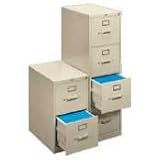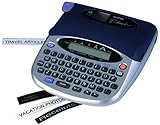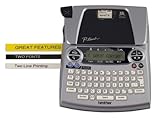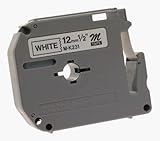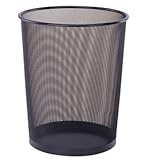Post 13 in the series: Recommended Productivity Tools
File Cabinets
When it comes to file cabinets, there are two rules:
- Get ones that don’t screech when you open them.
- Get ones where the drawer comes all the way out.
This rules out the Office Depot el cheapo $30 excuses for file cabinets.
But, also at Office Depot, are the Hon 2-drawer and 4-drawer file cabinets. Hon is a decent brand, and their cabinets meet the above criteria. They are more expensive than the $30 excuses, but are the cheapest file cabinets I’ve found that don’t waste your time.
Get 2-drawer or 4-drawer, depending on your needs. Don’t get the lateral ones that go in sideways. Get the ones that go in normally. Here’s the specific one I recommend, in both 2-drawer and 4-drawer options:
Now, I also recommend having some ordinary drawers at your desk, as I went over in the second post in this series. If your desk doesn’t have those built into it, there are some good drawer units that have two ordinary drawers on top, and then one file drawer below.
If that single file drawer gives you enough room for your files, then you don’t need to get an additional 2-drawer unit. Get the 2-drawer unit (or 4-drawer) if you need additional space.
Bookshelves
IKEA has fantastic bookshelves that look nice at a great price. I love IKEA in general for their motto “we’ll never stop making good design affordable” and for generally living up to it.
They’ve captured it well: keeping things affordable doesn’t mean getting ugly stuff. Good design can be obtained at a good price.
Here are the bookshelves that I use from IKEA:
You can also get the shorter 2-shelf unit, or some nice-looking cubed ones:
Conclusion
This brings us to the end of our series on recommended (physical) productivity tools. I will close the way I began: Having good tools matters.
First, because if you have good tools, you will often find yourself wanting to use them. And “one of the best tricks for enhancing your personal productivity is having tools you want to use.” Second, because bad tools get in the way. And third, because good tools in general make your workspace as a whole a place where you want to be.
Don’t be selectively strategic. Make your workspace work well for you in all respects — give it both an efficient setup and effective tools.
Posts in This Series
- Recommended Productivity Tools: An Introduction
- The Tools You Need to Have (And Where to Keep Them)
- Recommended In Boxes
- Recommended Capture Journals
- Recommended Pens
- Recommended Pencils and Paper Pads
- Recommended Staplers, Staple Removers, and Tape
- Recommended Scissors, Letter Openers, and Post-Its
- Recommended Paper Clips and Super Glue
- Not Recommended: Desktop Organizer Things
- Recommended Chairs and Waste Baskets
- Recommended Labelers and File Folders
- Recommended File Cabinets and Bookshelves
